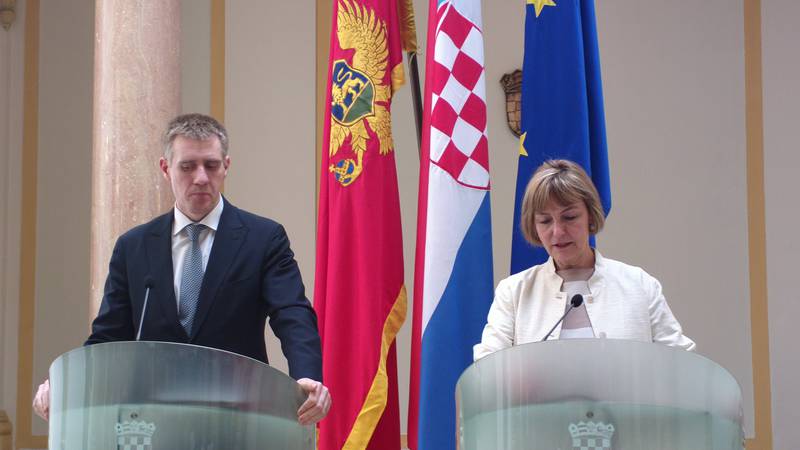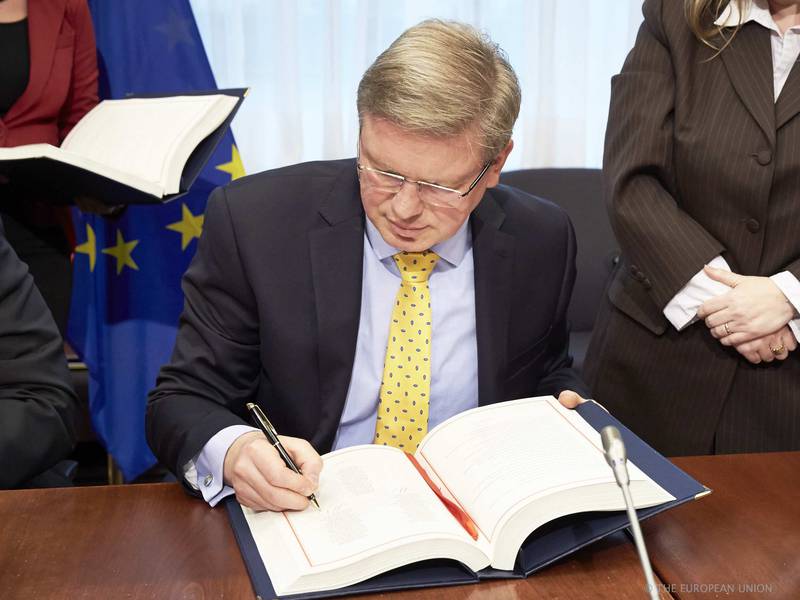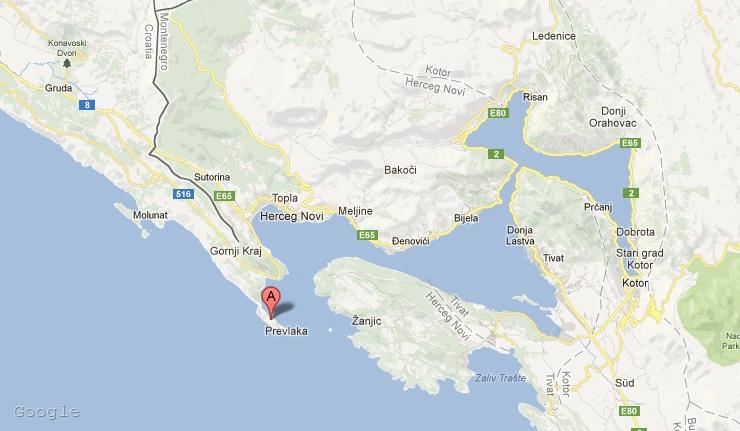Montenegro Is Divided In Opinion about its European Future*
Adelina Marini, August 1, 2012
It's true that Montenegro has a long way to go but it's also true that the country expected for a long time to receive a green light to start walking on that road. This is why it is strange that the society proved unprepared, politicians too, as it becomes clear from my conversation with Daliborka Uljarevic, executive director of the NGO Centre for Civic Education, which deals with European integration as well. According to an opinion poll, held in all the 9 municipalities of Montenegro, the population of the small mountain state, which is a bit over 600 000 people, can be divided into two groups: of those who believe that EU membership would bring them huge salaries, welfare state and more quality education and of those who believe that applying European standards would hurt the way they produce their wine or rakia (brandy), Daliborka Uljarevic tells euinside in her cosy and very European office in the centre of Montenegrin capital city Podgorica.
Does this sound familiar to you? In Bulgaria as well, the accession process was mainly associated with how "they" will stop our rakia, what will be the size of cucumbers and most of all - when. Montenegro seems to be on its way to repeat that same mistake for one reason - media and politicians, the young and very energetic Daliborka explains in a perfect English language, are interested only in dates: when will something happen to their country. In her words, the discourse about the EU is present in the rhetoric of the political parties on a very superficial level. The political leaders and stakeholders inform themselves mainly from the newspapers and magazines, they do not invest efforts in reading EU documentation, which is the cause for the superficial messages to society. According to her, work is mainly necessary in this direction - more information for the essence of the European integration process and most of all, no matter if Montenegro will become a true member of the Union or not, the integration process will have a positive impact on the country, it will contribute to democratisation.
 Daliborka Uljarevic also tells me that the most urgent reforms must be implemented in the judiciary because, even if reforms start in other areas, they will sooner or later need the judiciary and will stuck. She thinks that it is a good idea Montenegro to start the negotiations from the toughest chapters 23 and 24 ("Judiciary and Fundamental Rights" and "Justice, Freedom and Security") and that no one expects the country to complete the work on these chapters in a year or two. Moreover, the expectations are the negotiations to start and finish with these two chapters. Despite the many uncertainties, like for example what kind of an EU Montenegro will join, she shares the hypothesis of the chief negotiator of the country with EU, Alexandar Andrija Pejovic, that it is not impossible the negotiations to end this decade for the next multiannual financial budget, which begins in 2021. But she reiterates, as Mr Pejovic too by the way, that the process is more important than the result.
Daliborka Uljarevic also tells me that the most urgent reforms must be implemented in the judiciary because, even if reforms start in other areas, they will sooner or later need the judiciary and will stuck. She thinks that it is a good idea Montenegro to start the negotiations from the toughest chapters 23 and 24 ("Judiciary and Fundamental Rights" and "Justice, Freedom and Security") and that no one expects the country to complete the work on these chapters in a year or two. Moreover, the expectations are the negotiations to start and finish with these two chapters. Despite the many uncertainties, like for example what kind of an EU Montenegro will join, she shares the hypothesis of the chief negotiator of the country with EU, Alexandar Andrija Pejovic, that it is not impossible the negotiations to end this decade for the next multiannual financial budget, which begins in 2021. But she reiterates, as Mr Pejovic too by the way, that the process is more important than the result.
Full transcript of the interview with Daliborka Uljarevic
euinside: Montenegro has just received the green light for starting accession  negotiations, which took some time. How do you perceive this news? What is this going to do with Montenegro?
negotiations, which took some time. How do you perceive this news? What is this going to do with Montenegro?
Daliborka Uljarevic: I think this is a fantastic news for Montenegro because it's an encouragement for everything that has been done so far, but it's also a strong message to the government that EU will be following up with the further reforms in a more strict and a more patient manner which is important also for those within the government who were actually reluctant to undertake the reform process but were quite good in the rhetorics. And on the other hand I think it's very important for the region because it sends a message that the enlargement process is still going on even though there have been a lot of dilemmas and scepticism about it.
euinside: Do you have the feeling that in Montenegro people realise how high the stakes are for Montenegro because we had some issues in the EU, some not very good examples, now Croatia is a good example for being prepared? Do you think that Montenegro really realises how much work it needs to do?
Daliborka Uljarevic: I'm pretty much sure that neither the government nor the ordinary citizens are aware of the complexity of this process, regardless of the fact that the government would point out that it is a requiring process and that will actually bring a lot of the change. The level of the information which is important for the everyday life of the citizens is on an extremely low level and I think that there is a lot of work to be done there.
euinside: Who should do this work?
Daliborka Uljarevic: I think that this work should be done by all stakeholders who have already had developed programmes within the European affairs. That does not refer only to the NGOs, who did the most of this work, but also most active roles should be taken by the local authorities, media especially who are not specialising in the EU affairs, and the government who is sitting far too much in the offices, speaking really little with citizens.
euinside: Which area in society do you think that needs most urgent attention and reforms?
Daliborka Uljarevic: It's very difficult to give the precise reply concerning this but if we take the fact that one of the biggest burdens that this society is suffering from is corruption, I believe that the reform of the judiciary is the utmost priority because without that strong pillar, we cannot actually proceed with the other reforms.
euinside: What we have as an experience with Bulgaria, and I think to some extent Romania too, is that when the reforms process starts the system itself, especially the judiciary, starts resisting. Do you think that there's a realisation that things should be done in a different way - the Commission is already changing approach, it starts negotiations with Montenegro for the first time from these particular chapters that deal with judiciary, fundamental rights and things like that, but still do you think that there is a realisation that this is the area that is most difficult to reform?
Daliborka Uljarevic: The fact that it is most difficult doesn't mean that it should be left until the end. I think that the approach to face with that at the very beginning is very useful for Montenegrin society because otherwise we could have ended up in circling with the other reforms which would not have the support within this part. Nobody has said from the European Commission that all of the tasks from the chapter 23 and consequently chapter 24 should be done in a year or two. In fact, we got the message that these are the chapters that we will actually open and close the negotiations. So, there is enough of the time but this is also a test for the actual political willingness to start the effective reform process which has not been seen so far.
euinside: Your NGO is doing quite a lot of work, as far as I can see on civil education, European integration, things like that. You said that the level of knowledge is really low but is there something particular that you meet when doing your job, like resistance or scepticism, or vice versa - hope?
Daliborka Uljarevic: Talking with the citizens? We have been doing during this year and last year a huge project within the 9 Montenegro municipalities - visiting different municipalities, talking to people, conducting public opinion research and focus groups, we have discovered that Montenegro is not speaking with one voice. The opinion that have the citizens of Pljevlja does not have to correspond with anything with the opinion of the citizens of Herzeg Novi. They are different kinds of concerns and questions and the support for the EU integration process is varying enormously, starting from almost like 83 or 84% and going below 50% in some of the municipalities. Also, the questions that these citizens have and that they are posing are quite different. This is at the end sending a strong message to all of us who are eager to have the process going on on a more smooth and quality manner.
Citizens are having in a very broad manner two views on European integration: one is due to the fact that we are living quite difficult and the economic crisis is having its very negative result, the EU is seen as something which will as a magic change that overnight, bring the huge salaries, welfare state and more quality education. On the other hand, there are citizens who are reluctant to change their habits. They want to continue to prepare their rakia or wine in the exactly same manner as they did. They see everything which comes in a process of aligning with standards of the EU as the unnecessary complication which is not bringing any benefits to them. And they are showing quite high degree of scepticism. In both of the cases, the common point is that they lack genuine information on the EU and what the process is actually bringing to Montenegro. And in both of the cases it could bring a lot of the disappointment and burden to the further process.
euinside: While I was here these few days and I was speaking to various stakeholders and it seemed to me that all the expectations are about the reforms that the European integration is going to impose but in the same time I wonder and I ask everyone I speak to this question - is there a risk because of what's happening in the EU now for some kind of scepticism, for some kind of reforms stalling because of what is happening in the EU, because of the lack of knowledge what kind of a European Union Montenegro is going to join some time in the future?
Daliborka Uljarevic: Euroscepticism is already living in Montenegro. It's not articulated through any of the important social subjects, starting from the political parties, or NGOs, or media, or other public figures, but within the citizens it is living. And in one way it is the echo of what they have heard on turbulences within the EU but in most of that opinion it is actually the fear that they will lose more than they will get. I honestly believe that Montenegro is only getting with the process of approximation with the EU standards but also we need to start urgently work on this within the country because otherwise the legitimacy of the process will be questioned.
euinside: So you think that maybe some kind of an alternative should be thought about or deliberated 'what should we do if something happened to the EU', is that what you're saying?
Daliborka Uljarevic: I think that within the public discourse the main message that all of us should send and when I say all of us I'm talking about all of those who are really focusing on European affairs and wishing Montenegro more developed and being a member in the real sense, should be that this process is nothing else than democratisation of the country. So, it's regardless of the fact whether we will be actually the member of the EU or not, the country will be better off. We will be more developed in every sense, we'll be a safer society, a society of equal chances we are not now, and in that regard we can behave as Switzerland or some of the other countries or Norway, which can actually say 'no' to the EU.
euinside: You mentioned this shortly but can you please elaborate a little bit more - in what way does the EU exist in the rhetoric of political parties? In what way do they talk about the EU? Do they talk about it at all?
Daliborka Uljarevic: First of all, I think it's important to say that unfortunately within the political parties there is no real life long learning system, which also reflects to the knowledge about the EU. It's very superficial - they are learning from the newspapers and magazines and that reflects also to the messages they are sending. These messages are populistic, they are mainly referring to the dates we will get about this and this but not explaining both to their voting body or other citizens or stakeholders what will be the real changes within the process. And unfortunately I'm not an optimist that that's gonna change because of the format of the political leaders. We can only hope that we can have some new generations within the political parties who will actually send other messages.
euinside: I know that this is ... most people don't like this question because, you know, it's kind of hypothetic, but in your views, when you think about it, when you know what Montenegro is and what is the starting point, when do you think it is realistic that the country will be ready to join the EU in a perfect world, of course, when everything is just like it is with the EU itself?
Daliborka Uljarevic: There is one huge advantage of Montenegro and it is that it is a small system and it is in one way very difficult for the small system to undertake all of these obligations that even the big systems are doing but it's easier to control it and to influence these changes. So, I would say that if there is undoubtable political will to really engage with the process of European integration we will not have any problems and that could be really really fast. But even in the case where there is a like of this political will, due to the fact that the process has started, that you cannot stop it, I think it's going to happen in the coming financial perspective of the EU, probably by the end of it.
euinside: Thank you very much.
*This interview was realised thanks to the kind help of Boro Milovic from Open Montenegro, a non-governmental organisation, partner to euinside
 Bakir Izetbegovic, Andrej Plenkovic | © Council of the EU
Bakir Izetbegovic, Andrej Plenkovic | © Council of the EU Aleksandar Vucic, Recep Tayyip Erdogan | © Serbian Presidency
Aleksandar Vucic, Recep Tayyip Erdogan | © Serbian Presidency Jean-Claude Juncker, Zoran Zaev | © European Commission
Jean-Claude Juncker, Zoran Zaev | © European Commission Igor Luksic, Vesna Pusic | © Council of the EU
Igor Luksic, Vesna Pusic | © Council of the EU Stefan Fule | © Council of the EU
Stefan Fule | © Council of the EU | © Google
| © Google